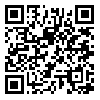2. 1. Young KS. Internet Addiction: The emergence of a new clinical disorder. CyberPsychol Behav; 1998. 1: 237-44.
3. 2. Widyanto L, Griffiths M. Does it really exist? (revised). In: Gackenbach J. Psychology and the Internet: Intrapersonal, interpersonal, and transpersonal implications. 2nd ed. San Diego: Academic Press; 2007. p. 141-63.
4. 3. Cho SM, Sung MJ, Shin KM, Lim KY, Shin YM. Does psychopathology in childhood predict internet addiction in male adolescents? Child Psychiat Hum Dev; 2013. 44(4): 255-69.
5. 4. Pen Y, Yang J, Liu L. Social Anxiety and Internet Addiction among Left-behind Children: The Mediating Effect of Loneliness. Iran J Public Health; 2017. 46(12): 1659-68.
6. 5. Mohammadkhani P, Alkasir E, Pourshahbaz A, Jafarian Dehkordi F, Soleimani Sefat E. Internet Addiction in High School Students and Its Relationship with the Symptoms of Mental Disorders. Iran Rehabil J; 2017. 15(2): 141-8.
8. 6. Gholamian B, Shahnazi H, Hassanzade A. The Prevalence of Internet Addiction and Its Association with Depression, Anxiety and Stress among High-School Students. Int J Pediatr; 2017. 5(4): 4763-70.
9. 7. Van Koningsbruggen GM, Hartman T, Eden A, Veling H. Spontaneous Hedonic Reactions to Social Media Cues. Cyberpsychol Behav; 2017. 20(5): 334-40.
10. 8. Desjarlais M, Joseph JJ. Socially Interactive and Passive Technologies Enhance Friendship Quality: An Integration of the Mediating Roles of Online and Offline Self-Disclosure. Cyberpsychol Behav; 2017. 20(5): 286-91.
11. 9. Gross JJ, Thompson RA. Emotion Regulation: Conceptual Fundaions. In Gross JJ. Handbook of emotion regulation. New York: Guilford Press; 2007. p. 3-24.
12. 10. Sari AC, Alkar OR. Mediator Role of Emotion Regulation between Personality Traits and Internet Addiction in Young People. J Addic Res Ther; 2019. 10: 378.
13. 11. Yildiz MA. Emotion regulation strategies as predictors of internet addiction and smartphone addiction in adolescents. J Edu Sci Psycho; 2017. 69(7): 66-78.
14. 12. Dehghanizade Z, Gharcheh S, Asghari K, Shabani H, Eydi-Baigi M. Relationship of Negative Strategies of Emotion Regulation with Anxiety and Depression in Students of Shiraz University of Medical Sciences. Ann Mil Health Sci Res; 2017. 15(3): e63315.
15. 13. Garnefski N, Kraaij V. Specificity of relations between adolescents’ cognitive emotion regulation strategies and symptoms of depression and anxiety. J Cog Emotion; 2018. 32(7): 1401-8.
16. 14. Tabachnic B, Fidel L. Using Multivariate Statistics. 6th ed. Pearson. 2013.
17. 15. Yusefi F. Study of the Relationship between Cognitive Emotion Regulation Sterategies and Depression and Anxiety among Intelligent Guidance School Students. Res Excep Child; 2006. 6(4): 871-92. (Persian)
18. 16. Young KS. Caught in the Net: How to recognize Internet addiction a winning strategy for recovery. New York: John Wiley and Sons Inc; 1996.
19. 17. Alavi SS, Isami M, Merati MR, Najafi M, Jannatifard F, Rezapoor H. Psychometric Characteristics Young’s Internet Addiction Test. J Behav Sci; 2012. 4(3): 183-9. (Persian)
20. 18. Fata L, Birashk B, Atefifard, MK, Dubson K. The conceptual structure of schemata, emotional states and cognitive processing of emotional information: A comparison within conceptual framework. J Thou Behav; 2005. 42: 312-26. (Persian)
21. 19. Clark DA, Beck AT, Alfred D. Scientific foundations of cognitive therapy and therapy of depression. New York: John Wiley & sons; 1999.
22. 20. Torres-Rodriguez A, Griffiths MD, Carbonell X. The Treatment of Internet Gaming Disorder: a Brief Overview of the PIPATIC Program. Int J Ment Health Addict; 2018. 16: 1000-15.
23. 21. Santos V, Freire R, Zugliani M, Cirillo P, Santos HHK, Nardi AE, King, ALS. Treatment Outcomes in Patients with Internet Addiction and Anxiety. MedicalExpress (Saopaulo Online); 2017. 4(2): M170206.
24. 22. Iannitell A, Parnanzone S, Quartini A, Gianfelice D, Pizziconi G, Serrone D, et al. Internet among Italian Students: Usefulness of Internet Addiction Test. J Psychopathol; 2018. 24: 10-15.
25. 23.Soulioti E, Stavropoulos V, Chrisidi S, Papastefanou Y, Roussos P. The ralationship of internet addiction with anxiety and depressive Symptomatology. Psychiariki; 2018. 29(2): 160-71.
26. 24. Al-Gamal E, Alzayyat A, Ahmad MM. Prevalence of internet addiction and its association with psychological distress and coping strategies among university students in Jordan. Perspect Psychiatr Care; 2016. 52(1): 49-61.
27. 25. Nolen-Hoeksema S, Parker LE, Larson J. Ruminative coping with depressed mood following loss. J Pers Soc Psychol; 1994. 67(1): 92-104.







